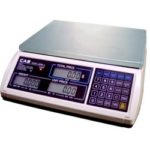Salter Brecknell PS3000 scale for weighing horses is accurate and reliable and a great choice for accurately weighing horses and other larger animals. The PS3000 scale helps to remove the guesswork when treatments or administration of feed needs to be closely monitored.
The Salter PS3000 horse weighing scale is accurate and affordable. The PS3000 is an ideal way to accurately weigh horses and other larger animals and helps to give accurate animal weights for treatments or administration of feed needs to be closely monitored. The PS3000 features a generous capacity of 3,000 pounds which makes it ideal for a wide range of horses. The full size 39.37″ W x 78.75″ L x 3.93″ H platform is large and makes weighing easier. The scale is large enough to avoid making animals skittish while weighing. Supplied with plywood mounting holes to allow customers a quick and simple way to fit their own plywood top to help reduce noise and risk of animals slipping. Can also be used in other general weighing applications to aid loading and unloading.
The digital weighing indicator includes a Hold function for single user weighing. The easy to use hold feature enables the scale to capture the weight and retain it while you tend to the animal. Battery operation is included for remote locations. This supplies full function with no AC power attached. AC adapter is included for charging or full time operations. Detachable indicator makes battery charging easy. This allows the indicator to be removed and taken to an AC power outlet for charging. No need to move the entire scale to the power source. Durable design for rigorous applications. This scale will insure years of use in even challenging environments.

